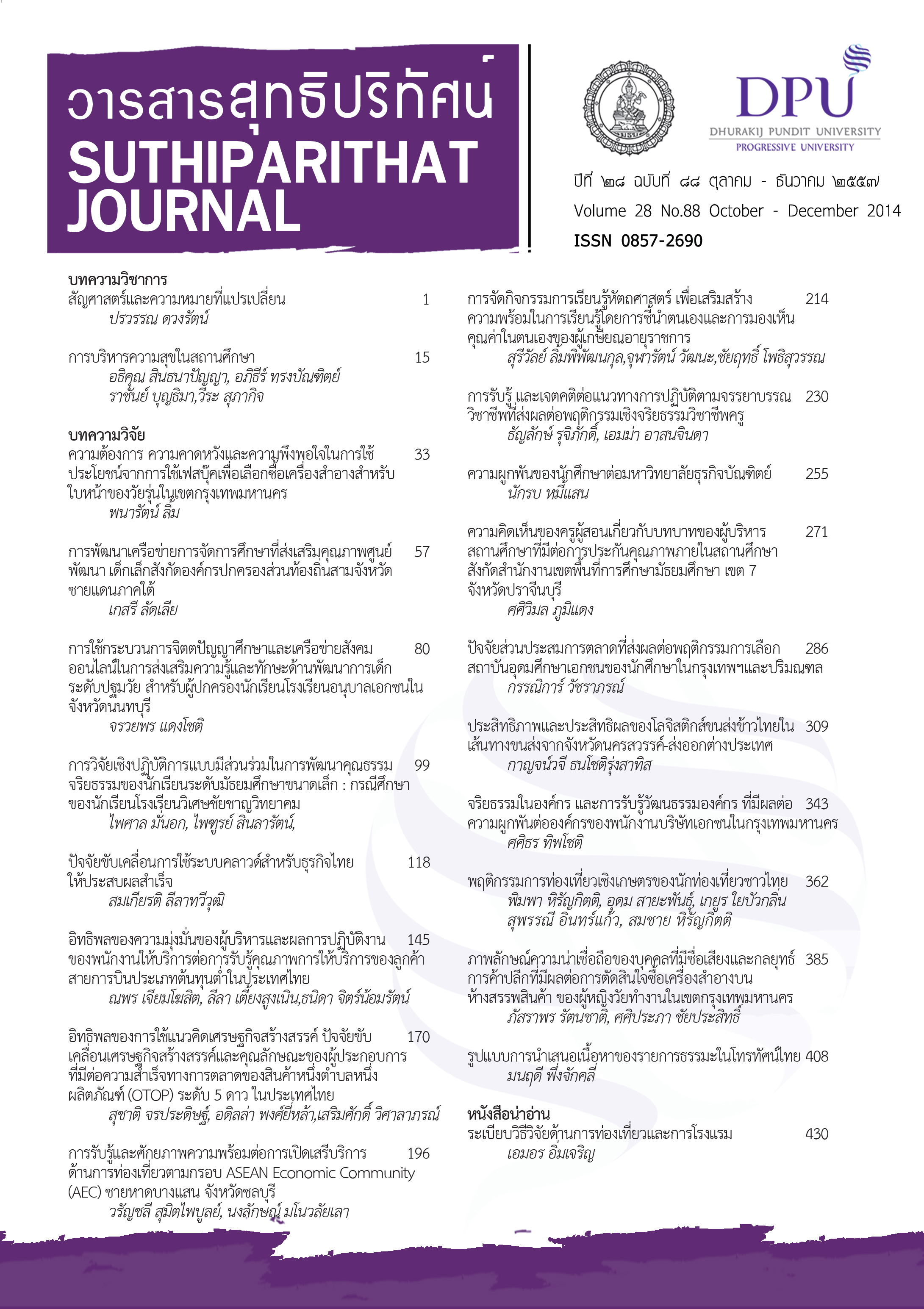AGRO-TOURISM BEHAVIOR OF THAI TOURISTS
Keywords:
Agro-tourismAbstract
This research aims to study personal data, opinions on agro-tourisms, motivation on agro-tourisms, satisfactions on agro-tourisms and agro-tourism behavior of 1,600 Thai agro-tourists. This research finds that tourists agree to establish the Tourism Information Service Center for providing information to tourists, being as shopping center for the agricultural produces/community products, and arranging training program to educate related persons on knowledge relating to tourism services and agro-tourism services. Motivations on agro-tourisms are the rests and relaxations, relief of stress, beauty of environmental condition and atmosphere of attraction areas. In addition, satisfactions on agro-tourisms on the aspect of motivation are environmental condition conservations, the nature of the tourist attraction areas, beauty, and suitability on the condition of the scenery in the tourist attraction areas. While the aspect of the agro-tourism behavior, the tourists are engaged in the agro-tourisms at the average of 4 times with the expenses categorized in most case is lower or equivalent to 1,500 Baht. Number of the tourists departing on tour in the morning and return in the evening is more than the number of tourists spending overnights with the average of 1 night stay. Most of the tourists prefer touring in the form of visiting fruit tree orchards and next in line are tours in the form of visiting the combined agricultures and in the form of seeing the flowers and decorative flowers, respectively.
References
การท่องเที่ยวแห่งประเทศไทย. (2545).การท่องเที่ยวเชิงนิเวศในมุมมองของคนในกรุงเทพมหานคร. กรุงเทพฯ : กระทรวงการท่องเที่ยวและกีฬา.
คณิต ดวงหัสดี. (2538).การพัฒนาการสอน.กรุงเทพฯ : สุวีริยาสาส์น.
จุฑารัตน์ เอื้ออำนวย. (2549).จิตวิทยาสังคม. กรุงเทพฯ : แอคทีฟพริ้นท์.
ฉลองศรี พิมลสมพงศ์. (2542).การวางแผนและพัฒนาตลาดการท่องเที่ยว.กรุงเทพฯ : มหาวิทยาลัยเกษตรศาสตร์.
ชูสิทธิ์ ชูชาติ. (2541).การใช้ภูมิปัญญาชาวบ้านในการอนุรักษ์ป่าและระบบนิเวศเพื่อแก้ปัญหาภัยแล้งของประเทศไทย. กรุงเทพฯ: สำนักงานคณะกรรมการวิจัยแห่งชาติ.
ปิยวรรณ คงประเสริฐ. (2551).การท่องเที่ยวเชิงนิเวศแบบบูรณาการเพื่อการวางแผนพัฒนาการท่องเที่ยวอย่างยั่งยืนที่เกาะพะงัน จังหวัดสุราษฎร์ธานี. (วิทยานิพนธ์ปริญญาวิทยาศาสตรมหาบัณฑิต). กรุงเทพฯ:มหาวิทยาลัยศรีนครินทรวิโรฒ.
ปรีชา แดงโรจน์. (2544).อุตสาหกรรมท่องเที่ยวสู่ศตวรรษที่ 21.กรุงเทพฯ: ไฟว์แอนด์โฟร์พริ้นติ้ง.
ประเสริฐ วิทยารัฐ. (2530).การจัดการการท่องเที่ยว. กรุงเทพฯ : เทพเนรมิตการพิมพ์.
พูนศักดิ์ วงศ์มกรพันธ์. (2547).ศักยภาพของพื้นที่สวนเกษตรเพื่อพัฒนาให้เป็นแหล่งท่องเที่ยวเชิงเกษตรกรรมในจังหวัดระยอง. กรุงเทพฯ: จุฬาลงกรณ์มหาวิทยาลัย
ยุรีพรรณ แสนใจยา. (2545).แนวทางการพัฒนาไร่ชาสุวิรุฬห์ อำเภอแม่ลาว จังหวัดเชียงราย. เชียงใหม่: มหาวิทยาลัยเชียงใหม่.
วินิจ วีรยางกูร. (2532).การจัดการอุตสาหกรรมท่องเที่ยว.กรุงเทพฯ : บริษัท เทรส แอนด์ ดีไซน์ จำกัด.
วิภาวรรณ พัฒนพงษ์. (2547).การรับรู้ข่าวสาร ปัจจัยจูงใจ ความพึงพอใจ และทัศนคติต่อการท่องเที่ยวเชิงเกษตรของ นักท่องเที่ยว จังหวัดสมุทรสงคราม. (วิทยานิพนธ์นิเทศศาสตรมหาบัณฑิต). กรุงเทพฯ: มหาวิทยาลัยธุรกิจบัณฑิตย์.
สถาพร วิเชียรดิษฐ์. (2547). ศักยภาพของการท่องเที่ยวเชิงอนุรักษ์. คณะสถาปัตยกรรมศาสตร์ จุฬาลงกรณ์มหาวิทยาลัย.
สำนักพัฒนาเกษตร กรมส่งเสริมการเกษตร. (2541). การพัฒนาศักยภาพการท่องเที่ยวไทย. กรุงเทพฯ : กระทรวงเกษตรและสหกรณ์.
อภิรมย์ พรหมจรรยา. (2546).การพัฒนาการท่องเที่ยวเชิงเกษตร กรณีศึกษาชุมชนเกาะมะพร้าว จังหวัดภูเก็ต.สงขลา: คณะอุตสาหกรรมบริการ มหาวิทยาลัยสงขลานครินทร์.
Yamane, T. (1973). Statistics : An Introductory Analysis (3rd ed.) New York : Harper International Edition.
Downloads
Published
How to Cite
Issue
Section
License
Content and information of the article published at Suthiparithat Journal are based on the sole opinions and responsibility of author(s) only. Neither the editorial board involve in......







